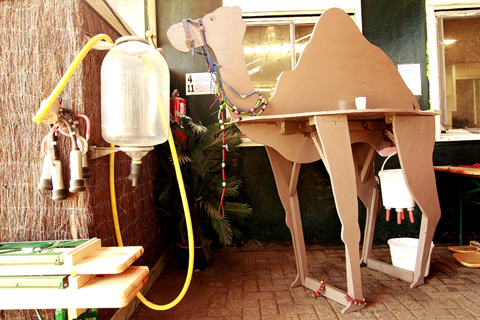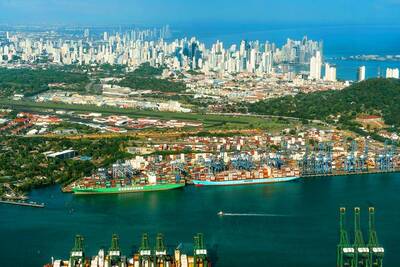Looking out of place against the lush Dutch maize fields, a few dozen camels saunter about between twice-daily milking sessions on Europe’s only commercial camel dairy farm.
Braying loudly and grazing lazily, the desert animals are the pet project of 26-year-old Dutch farmer Frank Smits, who overcame much ridicule and bureaucracy to start his unique venture.
“I started in 2006 with three dromedaries [camels with only one hump]. I have 40 today, of which 10 produce milk,” Smits said on his farm in the northern town of Cromvoirt.

PHOTO: AFP
Describing himself as a “cow fanatic” who studied marketing and agriculture, Smits said he switched his attention to camels after reading about the virtues of their milk.
It is less fatty and lower in lactose than cow’s milk, he said, but sweeter to drink.
The UN’s Food and Agricultural Organization said camel’s milk is more nutritious than many others and easier to digest for diabetics and lactose intolerant individuals.
Smits sells about 60 liters a day to a market comprised mostly of Turkish and Moroccan immigrants who traditionally drink camel’s milk in their native countries.
“I sell my milk for six euros [US$9] a liter to about 50 Turkish, Arabic and organic food shops in the Netherlands, Belgium and the UK,” he said, but admitted that he had not yet turned a profit.
“I refuse to work with large retail chains who offer farmers ridiculously low prices,” he said.
Smits said his farm should become profitable within two years once he has 15 milk producing camels. Camels reach calf-bearing, and thus milk-producing age, at about four. “In the long run, I hope to have 40,” he said.
The dromedaries are milked one by one, morning and night, by a machine specially adapted to their teats. Each cow provides about 6 liters of milk per day, compared with about 30 liters from a cow.
“They can be very stubborn and only give milk if their young are close by,” said Martijn Spierings, 21, who volunteers as a farm helper.
“At the slightest stress, the source dries up,” he said.
Of the 40 animals on the farm, a dozen have given birth to young. Most of the others are pregnant — all from the sole male of the group.
Smits’ start in the business was not easy, he said.
“I had to find the camels, endure the skepticism of people around me and the protests of animal activists:” he said.
Under EU regulations, camels cannot be imported from outside Europe, but after searching for several months, Smits managed to find a few specimens in Spain’s Canary Islands.
He scraped together his savings and borrowed some money to buy his first camels at 7,000 euros a piece.
He said he jumped through hoops to meet stringent conditions for obtaining a production permit, and stated proudly that his milk meets all the sanitary standards.
One hurdle was the fact that camel’s milk is never pasteurized — “otherwise it loses all its qualities,” Smits said.
Anton Mentink of the Netherlands Controlling Authority for Milk and Milk Products said his service conducts regular checks at the camel dairy because of a risk factor in unpasteurized milk but “there have been no problems so far.”
“We know this farm well, it has all the required permits and meets all our health and hygiene standards,” Mentink said.
Smits believes his farm can serve as a good case study for animal activists who initially opposed his plans.
“I can be used as an example for other farmers, the camels walk around freely and everything is organic,” he said.
Smits now plans to develop new camel milk products like chocolate, ice cream, cheese and soap for people with conditions like diabetes or eczema.
Making cheese has proven more difficult, he said, as camel’s milk has no casein, a milk protein that acts as a binding agent.
“We are still experimenting,” said Smits, who said he had plans to move to bigger premises soon.

LIMITS: While China increases military pressure on Taiwan and expands its use of cognitive warfare, it is unwilling to target tech supply chains, the report said US and Taiwan military officials have warned that the Chinese People’s Liberation Army (PLA) could implement a blockade within “a matter of hours” and need only “minimal conversion time” prior to an attack on Taiwan, a report released on Tuesday by the US Senate’s China Economic and Security Review Commission said. “While there is no indication that China is planning an imminent attack, the United States and its allies and partners can no longer assume that a Taiwan contingency is a distant possibility for which they would have ample time to prepare,” it said. The commission made the comments in its annual

DETERMINATION: Beijing’s actions toward Tokyo have drawn international attention, but would likely bolster regional coordination and defense networks, the report said Japanese Prime Minister Sanae Takaichi’s administration is likely to prioritize security reforms and deterrence in the face of recent “hybrid” threats from China, the National Security Bureau (NSB) said. The bureau made the assessment in a written report to the Legislative Yuan ahead of an oral report and questions-and-answers session at the legislature’s Foreign Affairs and National Defense Committee tomorrow. The key points of Japan’s security reforms would be to reinforce security cooperation with the US, including enhancing defense deployment in the first island chain, pushing forward the integrated command and operations of the Japan Self-Defense Forces and US Forces Japan, as

IN THE NATIONAL INTEREST: Deputy Minister of Foreign Affairs Francois Wu said the strengthening of military facilities would help to maintain security in the Taiwan Strait Japanese Minister of Defense Shinjiro Koizumi, visiting a military base close to Taiwan, said plans to deploy missiles to the post would move forward as tensions smolder between Tokyo and Beijing. “The deployment can help lower the chance of an armed attack on our country,” Koizumi told reporters on Sunday as he wrapped up his first trip to the base on the southern Japanese island of Yonaguni. “The view that it will heighten regional tensions is not accurate.” Former Japanese minister of defense Gen Nakatani in January said that Tokyo wanted to base Type 03 Chu-SAM missiles on Yonaguni, but little progress

IN THE MIDDLE: Some of the lawmakers defended the trip as an opportunity for investment, cooperation and to see models that could help modernize Panama A planned trip by some Panamanian lawmakers to Taiwan has unleashed the latest diplomatic spat with China as the Central American country tries to navigate the turbulent waters between the Asian superpower and the US. The Panamanian Ministry of Foreign Affairs and the US ambassador to the country on Wednesday criticized China’s diplomats in Panama for asking the lawmakers to cancel their trip to Taiwan, with the ministry accusing the Chinese embassy of “meddling” in its internal affairs. That followed comments from Panamanian President Jose Raul Mulino a week earlier saying that the planned Taiwan trip did not have the approval of